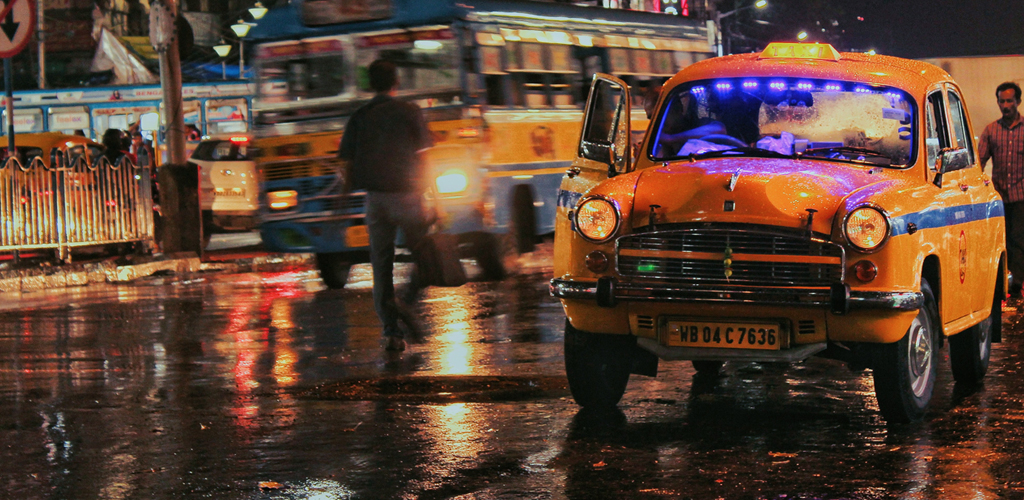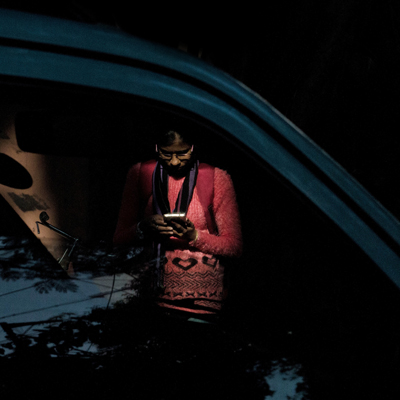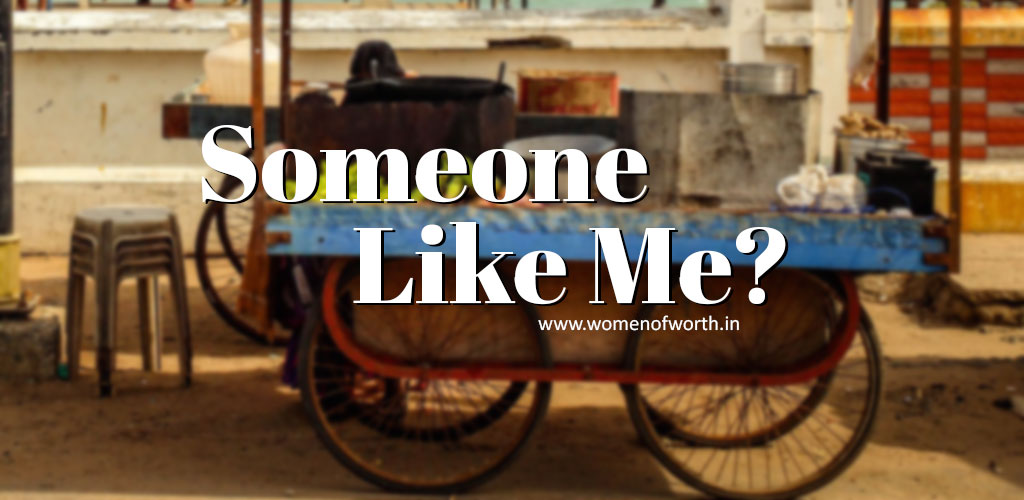
by Fenny Kanagaraj | Jul 30, 2018 | Girl Arise
Walls painted pink and green with windows as small as a pigeonhole. Narrow staircases with colorful sarees hanging all around is the sight of a room in a red light area. Young and old wait in the alleys with their faces painted and bodies perfumed, covering up a multitude of emotions, selling sex to men who frequent the area from different walks of life – the educated, the illiterate, the rich, the poor, the affluent and so on.
After a short walk, I entered a shack-like room. A young girl named Pinky caught my attention as she carefully examined my footwear that was piled up with some other footwear just outside the door. I sat next to her as she continued to show interest in my footwear and asked if it belonged to me. I responded and offered it to her. In exchange I got to wear her footwear and realized how hard it was to walk in her shoes. Though she didn’t quite fit into mine, she was happy with the exchange for the moment. As we got talking, I got a glimpse of her world through her eyes.
Pinky, caught in a cycle of poverty and exploitation, works in the brothel serving 15 to 20 customers a day on average. She finds momentary comfort for her cravings for love and care from her customers who frequent her. Although she admits that she goes through a gush of mixed emotions, she has learnt the art of numbing her feelings and finding joy in the little things around her – as simple as wearing someone else’s shoes. Within minutes, Pinky was busy answering calls from her customers and did not seem interested in me or my shoes anymore. She left me sitting on a bench wondering what her world is like. She definitely did not belong to the brothel but she was convinced that there was no way out for girls like her. She roams around the red light area like prey that has already surrendered its life to the predator who is too big to fight . Perhaps my few minutes in her shoes rocked my core being to the extent that my encounter with her has now become one of the most unforgettable moments of my life.
 As I walked back through the alleys and took a closer look at the painted expressionless faces, I could see an out-pour of hopelessness, fear and anxiety. Behind every painted face is a story that got them into the murky world – some have been pushed into the trade by poverty, abuse and desperation while some others are trapped and tricked into the trade by pimps. Whatever the reason, they live a life that is frightening, controlled and misused by the business-owners, abused by violent customers and become victims of the corrupt system. Rape, abuse, violence and many other crimes are a daily occurrence that is considered part of a normal routine.
As I walked back through the alleys and took a closer look at the painted expressionless faces, I could see an out-pour of hopelessness, fear and anxiety. Behind every painted face is a story that got them into the murky world – some have been pushed into the trade by poverty, abuse and desperation while some others are trapped and tricked into the trade by pimps. Whatever the reason, they live a life that is frightening, controlled and misused by the business-owners, abused by violent customers and become victims of the corrupt system. Rape, abuse, violence and many other crimes are a daily occurrence that is considered part of a normal routine.
Alcohol and drugs add a rosy haze to everything – a crutch that many of them rely on to make life bearable. Though outwardly, they seem to have dressed to attract customers, a closer look at their faces communicate the contrary.
This issue of commercial sex work, abuse, human trafficking and violence against women is a global phenomenon. Looking through Pinky’s eyes, I wonder what it would take to empower young women like her to stand up for justice and change. I wonder what it would take to fight the giant predators rather than surrendering. There are several individuals and social entities that have been combating violence against women, but for many, the situation of hopelessness remains.
However, I believe a change to this situation begins at our homes, our work places and our spheres of influence. Educating our children to respect women will set the bar high on women’s safety and protection. Every act of respect for man and woman is one step closer to making our society a safer place.
Every fight against injustice is worth the risk, worth the love and worth the cost. Let us stand up for Justice, Equality and Change.
This international anti trafficking day we remember Pinky, and all those children trafficked whose stories are like hers.
Fenny Kanagaraj is Partnerships Director at WOW and mother of two. She is a networker and bridge creator.

by WOW | Jun 18, 2018 | Blog, Fearless Project, Girl Arise
“You don’t know what people here are like, especially towards someone like you.”
This was one of the first warnings given to me when I arrived in the village. The statement correspondingly led to the meeting of him, my security guard, assigned by the school to ensure my safety for the semester.
Why do I need a security guard? What do they mean someone like me? A teacher? A researcher? An advocate? A musician? A student? A traveller?
A woman. But really, an outsider woman.
 I had just moved to a small village in rural Punjab to begin a six month teaching contract in an exclusively female college. I was expected to stay inside the college grounds most of the time, and only leave with the assistance of my security guard.
I had just moved to a small village in rural Punjab to begin a six month teaching contract in an exclusively female college. I was expected to stay inside the college grounds most of the time, and only leave with the assistance of my security guard.
For the first 2 months I used to pay him to leave me alone, to ‘forget’ to leave the gate unlocked and to develop alibis if anyone asked my location. I paid him for my freedom as I couldn’t surrender to the protocol that was implemented for my benefit. My fierce, independent, over confident, (naïve) 22 year old ego didn’t allow me to be spoken for by a guard.
My ego realised my independence cost 250 rupees and a hot masala chai from the favourite corner side vendor. Those 250 rupees paid for me to travel all over Punjab, being fully immersed in a different culture. I didn’t know it yet that the experience would alter my existence, forever being changed by the stories of the lives I encountered.
Opening up my security guard took three months. I wanted to know him, learn him, understand him. This man who is assigned to be with me every day but I don’t know anything about. Finally by month three he began to talk, and more yet, smile. The rest followed like a montage in a film, supported with a cheesy soundtrack, sepia undertone and laughing audio bites to portray the fast development of our friendship.
 He said he considered me as his daughter, and needed me to meet the rest of his family so they could all love me as much as he did. The first visit to his home was where the real initiation process occurred, the bridge transforming this friendship into family. The kindness and warmth was overwhelming, not only did I have a new Indian father but a mother and 2 brothers! He never had a daughter, but always wanted one. I was a blessing, an answering to his prayers, after all these years God had finally answered him. I had never experienced the love and intensity of a Punjabi family. It was like the rewriting of my history, as if I could see the baby pictures of me materialise into their photo albums. I could feel my blood starting to run hot with the blood of a new identity, a Punjabi identity.
He said he considered me as his daughter, and needed me to meet the rest of his family so they could all love me as much as he did. The first visit to his home was where the real initiation process occurred, the bridge transforming this friendship into family. The kindness and warmth was overwhelming, not only did I have a new Indian father but a mother and 2 brothers! He never had a daughter, but always wanted one. I was a blessing, an answering to his prayers, after all these years God had finally answered him. I had never experienced the love and intensity of a Punjabi family. It was like the rewriting of my history, as if I could see the baby pictures of me materialise into their photo albums. I could feel my blood starting to run hot with the blood of a new identity, a Punjabi identity.
A nightly ritual began where I would join Papa Ji for a 7pm chai outside his station near the gate of the college. Each day I looked forward to my 7pm chai’s, like a treat at the end of a long working day where I could replicate the feeling of home. One night I arrived at the gate station and resumed my normal seat like every other day for the past 3 months, but this time Papa Ji told me to bring my chair inside the office. Without a second thought I complied, chai in one hand, chair in the other, mid-sentence debriefing about my day until I heard the door lock behind me. It was then, locked in a gate keeper’s station, did I feel my chai fly out of my hand as I was pinned against the wall with full force.
Then, my Papa Ji, kissed me against my will.
 The kiss felt like a knife to my lips slit me open and all the newly acquired Punjabi blood spilled out. The baby pictures unmaterialised, my 5 year old self pixelated before dissipating into nothing. The memories tainted beyond redemption. It was as if my entire Punjabi family entered a car and had a head on collision on the highway, but the one who died was me, as I evaporated out of the delusion I put myself into.
The kiss felt like a knife to my lips slit me open and all the newly acquired Punjabi blood spilled out. The baby pictures unmaterialised, my 5 year old self pixelated before dissipating into nothing. The memories tainted beyond redemption. It was as if my entire Punjabi family entered a car and had a head on collision on the highway, but the one who died was me, as I evaporated out of the delusion I put myself into.
The irony is, he was the one to protect me, he was the one hired purely for the sole reason of my safety, and he was the one who breached it. Not just physically, but emotionally abusing me. It was then I realised this is how every child who goes home to an abusive family member feels. That confusion of what does it mean to be safe? What does it mean to be loved? When my father/mother/uncle/aunt/cousin tells me they love me yet continue to hurt me, is that the definition of love? Why does love feel so bad?
53% of people in India have been sexually abused as a child, and 88% of those abused have been abused by their parent. I, luckily, at the age of 22 knew my rights and my worth to address this problem and take proper steps to deal with it. A child would not know. A child is the emblem of purity and child sexual abuse is a crime against innocence. It is our responsibility as adults to protect our children, and defend that innocence.
Speak up, dare to be fearless.
Eliza van der Sman is a passionate human and animal rights activist with a love for words. Her curiosity and background in anthropology has taken her to 65 countries, where she found her second home in India. She now stays here dedicated to working towards the empowerment of women.

 As I walked back through the alleys and took a closer look at the painted expressionless faces, I could see an out-pour of hopelessness, fear and anxiety. Behind every painted face is a story that got them into the murky world – some have been pushed into the trade by poverty, abuse and desperation while some others are trapped and tricked into the trade by pimps. Whatever the reason, they live a life that is frightening, controlled and misused by the business-owners, abused by violent customers and become victims of the corrupt system. Rape, abuse, violence and many other crimes are a daily occurrence that is considered part of a normal routine.
As I walked back through the alleys and took a closer look at the painted expressionless faces, I could see an out-pour of hopelessness, fear and anxiety. Behind every painted face is a story that got them into the murky world – some have been pushed into the trade by poverty, abuse and desperation while some others are trapped and tricked into the trade by pimps. Whatever the reason, they live a life that is frightening, controlled and misused by the business-owners, abused by violent customers and become victims of the corrupt system. Rape, abuse, violence and many other crimes are a daily occurrence that is considered part of a normal routine.


 I had just moved to a small village in rural Punjab to begin a six month teaching contract in an exclusively female college. I was expected to stay inside the college grounds most of the time, and only leave with the assistance of my security guard.
I had just moved to a small village in rural Punjab to begin a six month teaching contract in an exclusively female college. I was expected to stay inside the college grounds most of the time, and only leave with the assistance of my security guard. He said he considered me as his daughter, and needed me to meet the rest of his family so they could all love me as much as he did. The first visit to his home was where the real initiation process occurred, the bridge transforming this friendship into family. The kindness and warmth was overwhelming, not only did I have a new Indian father but a mother and 2 brothers! He never had a daughter, but always wanted one. I was a blessing, an answering to his prayers, after all these years God had finally answered him. I had never experienced the love and intensity of a Punjabi family. It was like the rewriting of my history, as if I could see the baby pictures of me materialise into their photo albums. I could feel my blood starting to run hot with the blood of a new identity, a Punjabi identity.
He said he considered me as his daughter, and needed me to meet the rest of his family so they could all love me as much as he did. The first visit to his home was where the real initiation process occurred, the bridge transforming this friendship into family. The kindness and warmth was overwhelming, not only did I have a new Indian father but a mother and 2 brothers! He never had a daughter, but always wanted one. I was a blessing, an answering to his prayers, after all these years God had finally answered him. I had never experienced the love and intensity of a Punjabi family. It was like the rewriting of my history, as if I could see the baby pictures of me materialise into their photo albums. I could feel my blood starting to run hot with the blood of a new identity, a Punjabi identity. The kiss felt like a knife to my lips slit me open and all the newly acquired Punjabi blood spilled out. The baby pictures unmaterialised, my 5 year old self pixelated before dissipating into nothing. The memories tainted beyond redemption. It was as if my entire Punjabi family entered a car and had a head on collision on the highway, but the one who died was me, as I evaporated out of the delusion I put myself into.
The kiss felt like a knife to my lips slit me open and all the newly acquired Punjabi blood spilled out. The baby pictures unmaterialised, my 5 year old self pixelated before dissipating into nothing. The memories tainted beyond redemption. It was as if my entire Punjabi family entered a car and had a head on collision on the highway, but the one who died was me, as I evaporated out of the delusion I put myself into.